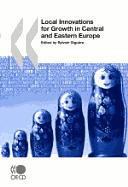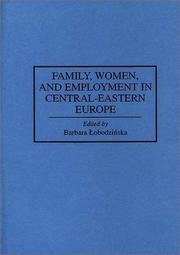| Listing 1 - 10 of 13 | << page >> |
Sort by
|
Book
Year: 1997 Publisher: Boulder, Colo. ; Oxford, UK Westview Press
Abstract | Keywords | Export | Availability | Bookmark
 Loading...
Loading...Choose an application
- Reference Manager
- EndNote
- RefWorks (Direct export to RefWorks)
Periodical
Year: 1996 Publisher: Basingstoke London New York MacMillan Press St. Martin's Press
Abstract | Keywords | Export | Availability | Bookmark
 Loading...
Loading...Choose an application
- Reference Manager
- EndNote
- RefWorks (Direct export to RefWorks)
Europe [Eastern ] --- Economic conditions --- 1989 --- -Europe [Eastern ] --- Economic policy --- Social conditions --- -Europe, Eastern - Economic conditions - 1989 --- -Europe, Eastern - Economic policy - 1989 --- -Europe, Eastern - Social conditions - 1989 --- -Europe, Eastern - Social conditions - 1989-

ISBN: 0521467489 Year: 1994 Publisher: Washington, D. C. Cambridge [England] New York Woodrow Wilson Center Press Cambridge University Press
Abstract | Keywords | Export | Availability | Bookmark
 Loading...
Loading...Choose an application
- Reference Manager
- EndNote
- RefWorks (Direct export to RefWorks)

ISBN: 1281720259 9786611720254 9264038523 9264038515 Year: 2007 Publisher: Paris : OECD,
Abstract | Keywords | Export | Availability | Bookmark
 Loading...
Loading...Choose an application
- Reference Manager
- EndNote
- RefWorks (Direct export to RefWorks)
Local development strategies represent an important response to the challenges of globalisation, while providing a mechanism for seizing the new opportunities that globalisation offers. Nearly two decades after the fall of the Berlin wall, this book evaluates progress made and identifies what needs to be done to speed up the drive towards prosperity in Central and Eastern Europe. It demonstrates that the success of local development strategies depends on the capacity of the government and its partners to accelerate change within the policy and governance aspects of economic and social development.
Europe, Eastern -- Economic conditions -- 1989-. --- Europe, Eastern -- Economic policy -- 1989-. --- Europe, Eastern -- Social conditions --1989-. --- Business & Economics --- Economic History --- Europe, Eastern --- Economic policy --- Economic conditions --- Employment --- Governance --- Urban, Rural and Regional Development
Book
ISBN: 3030839923 3030839931 9783030839925 9783030839925 Year: 2022 Publisher: Cham: Palgrave Macmillan, Springer Nature Switzerland,
Abstract | Keywords | Export | Availability | Bookmark
 Loading...
Loading...Choose an application
- Reference Manager
- EndNote
- RefWorks (Direct export to RefWorks)
Europe, Eastern - History - 1989 --- -Europe, Central - History - 1989 --- -Europe, Eastern - Politics and government - 1989 --- -Europe, Central - Politics and government - 1989 --- -Europe, Eastern - Social conditions - 1989 --- -Europe, Central - Social conditions - 1989 --- -Europe, Eastern - History - 1989 --- -Europe, Eastern --- Europe, Central --- Europe, Eastern

ISBN: 031329402X Year: 1995 Volume: 112 Publisher: Westport, Conn. ; London Greenwood Press
Abstract | Keywords | Export | Availability | Bookmark
 Loading...
Loading...Choose an application
- Reference Manager
- EndNote
- RefWorks (Direct export to RefWorks)
Families --- Post-communism --- Women --- Familles --- Postcommunisme --- Femmes --- Employment --- Economic conditions --- Social conditions --- Travail --- Conditions économiques --- Conditions sociales --- Europe, Eastern --- Europe de l'Est --- Conditions économiques --- Europe [Eastern ] --- Family --- 1989 --- -Women - Europe, Eastern - Social conditions. --- Women - Employment - Europe, Eastern. --- Women - Europe, Eastern - Economic conditions. --- Family - Europe, Eastern. --- Europe, Eastern - Social conditions - 1989 --- -Post-communism --- -Families --- Women - Europe, Eastern - Social conditions. --- Europe, Eastern - Social conditions - 1989-
Book
ISBN: 9782296066847 2296066844 Year: 2008 Publisher: Paris: L'Harmattan,
Abstract | Keywords | Export | Availability | Bookmark
 Loading...
Loading...Choose an application
- Reference Manager
- EndNote
- RefWorks (Direct export to RefWorks)
Political science --- Social change --- Science politique --- Changement social --- European Union --- Europe, Eastern --- Europe, Central --- Social conditions --- Social change - Europe, Eastern --- Social change - Europe, Central --- Europe, Eastern - Social conditions - 1989 --- -Europe, Central - Social conditions - 1989 --- -Political science --- -Social change - Europe, Eastern --- -Social change
Book
ISBN: 8373061762 8373061770 8373061754 9788373061767 9788373061750 9788373061774 Year: 2004 Volume: 92 Publisher: Lublin: Towarzystwo naukowe katolickiego uniwersytetu Lubelskiego,
Abstract | Keywords | Export | Availability | Bookmark
 Loading...
Loading...Choose an application
- Reference Manager
- EndNote
- RefWorks (Direct export to RefWorks)
Europe, Eastern --- Europe, Central --- Former Soviet republics --- Social conditions --- Social conditions. --- Economic conditions --- Economic conditions. --- Europe, Eastern - Social conditions - 1989 --- -Europe, Central - Social conditions. --- Former Soviet republics - Social conditions. --- Europe, Eastern - Economic conditions - 1989 --- -Europe, Central - Economic conditions. --- Former Soviet republics - Economic conditions.
Book

ISBN: 9780415460224 0415460220 Year: 2008 Publisher: Abingdon : Routledge,
Abstract | Keywords | Export | Availability | Bookmark
 Loading...
Loading...Choose an application
- Reference Manager
- EndNote
- RefWorks (Direct export to RefWorks)
This book focuses on questions of identity that have confronted the countries of Central and Eastern Europe after the collapse of the communist system that had previously provided them with an identity. This development both facilitated and necessitated a reassessment of the now independent nations' history, orientation, symbols and identity. In some cases, new states were created without a clear national identity, while in others the nation was regaining statehood, but not always within borders that had an historical association with the nation concerned.The multiethnic character of the space of the former Soviet Union and its erstwhile "satellites," and the long historical legacy of complex relations, boundary changes, population migration, and economic and social changes presented different challenges to the various nations and states concerned. The essays in this volume attempt to elucidate and understand the issues of ethnic and national identity and their relationship to the emerging statehood in various regions of the post-communist world. This study makes clear that some nation-states were far better prepared to handle these issues than others, and that the longer-term impact of the communist experience has varied. This book was previously published as a special issue of "Nationalities Papers"
Group identity --- Post-communism --- Collective memory --- Democracy --- National security --- Europe, Eastern --- Social conditions --- Politics and government --- Group identity - Europe, Eastern --- Post-communism - Europe, Eastern --- Collective memory - Europe, Eastern --- Democracy - Europe, Eastern --- National security - Europe, Eastern --- Europe, Eastern - Social conditions - 1989 --- -Europe, Eastern - Politics and government - 1989 --- -Group identity - Europe, Eastern --- -Group identity
Book
ISBN: 9786155211331 9786613906540 9786155053719 1283594099 9786155053719 6155053715 6155211337 9781283594097 6613906549 Year: 2012 Publisher: Buapest : Baltimore, Md. : Central European University Press, Project MUSE,
Abstract | Keywords | Export | Availability | Bookmark
 Loading...
Loading...Choose an application
- Reference Manager
- EndNote
- RefWorks (Direct export to RefWorks)
Does capitalism emerging in Eastern Europe need as solid ethnic or spiritual foundations as some other "Great Transformations" in the past? Apparently, one can become an actor of the new capitalist game without belonging to the German, Jewish, or, to take a timely example, Chinese minority. Nor does one have to go to a Protestant church every Sunday, repeat Confucian truisms when falling asleep, or study Adam Smith's teachings on the virtues of the market in a business course. He/she may just follow certain quasi-capitalist routines acquired during communism and import capitalist culture (more exactly, various capitalist cultures) in the form of down-to-earth cultural practices embedded in freshly borrowed economic and political institutions. Does capitalism come from outside? Why do then so many analysts talk about hybridization? This volume offers empirical insights into the current cultural history of the Eastern European economies in three fields: entrepreneurship, state governance and economic science. The chapters are based on large case studies prepared in the framework of an eight-country research project (funded by the European Commission, and directed jointly by the Center for Public Policy at the Central European University and the Institute for Human Sciences) on East-West cultural encounters in the ex-communist economies.
Capitalism -- Europe, Eastern. --- Europe, Eastern -- Economic conditions -- 1989-. --- Europe, Eastern -- Economic policy -- 1989-. --- Europe, Eastern -- Social conditions -- 1989-. --- Post-communism -- Europe, Eastern. --- Capitalism --- Post-communism --- Business & Economics --- Economic History --- Europe, Eastern --- Economic conditions --- Economic policy --- Social conditions --- E-books --- Banks, Cultural studies, East and West, Economic policy, European Union, Postcommunism, Transition. --- Kovács, János Mátyás. --- Zentai, Violetta.
| Listing 1 - 10 of 13 | << page >> |
Sort by
|

 Search
Search Feedback
Feedback About UniCat
About UniCat  Help
Help News
News